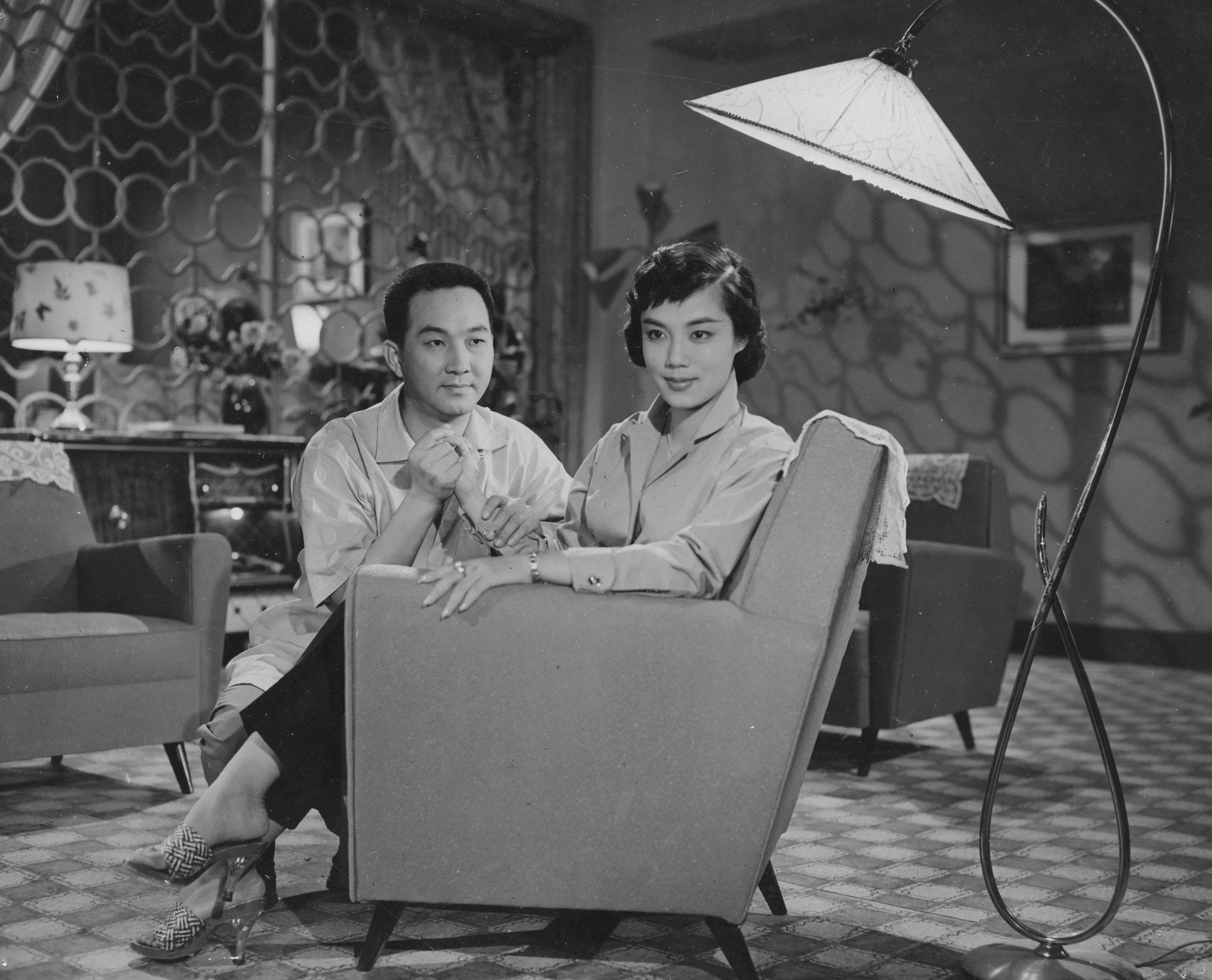唐山阿嫂 (CHINA WIFE) (Singapore, 1957, Chan Man & Chor Yuen 楚原)
/唐山阿嫂 (CHINA WIFE) is a transposition into modern day of the legend of Quin Xianglian, dating back to the sixteenth century, often adapted into opera and films, though its most direct antecedent is a play SERACHING FOR THE HUSBAND OVERSEAS (HAIWAI XUNFU) which had also been filmed at least once before… [it is] a classic ‘message’ film that strives to teach the public about prejudice, superstitions, and the values of family… 唐山阿嫂 (CHINA WIFE) was the most commercially successful film in the ‘Nanyang Trilogy.’ —Stephen Teo, Asian Film Archive
In 唐山阿嫂 (CHINA WIFE), Keung Chung-ping plays Ah-gau, an impoverished man who leaves his wife, So-ching (Nam Hung), and baby in Macau to travel to Southeast Asia and join his cousin (Patrick Tse) in search of better employment. A series of fortunate events propel him into high society, and soon he falls in love with a tycoon’s daughter, Ming-chu (Patsy Kar Ling).
Greed causes Ah-gau to change his name to erase traces of his former life. Abandoned by Ah-gau, So-ching suffers in poverty and decides to journey to Singapore to search for her husband.
Film critic and scholar Stephen Teo writes:
As a journey film, CHINA WIFE has more scenes set in Singapore and Malaya than does BLOOD VALLEY, which is actually set in Hong Kong for about two-thirds of the narrative… thus, CHINA WIFE is more of a ‘Nanyang’ film (or a more Malayan movie). This appears to have conferred on the film a richer social content. A critic at the time wrote that the film contained more ‘descriptions of the hardships of life, as exemplified by the scenes set in an Ipoh mine where many overseas Chinese men and women work to scrape a living fro meager wages and under rain or shine.’ There is also a clear feminist subtext that underwrites the eeducational function of the film overall. The ‘China Wife’ image of Nam Hung (who gives a memorable performance) evokes instant sympathy, structuring the film as a feminist piece.
南洋三部曲 (THE NANYANG TRILOGY) is a triptych of films filmed in Singapore and Malaysia that was produced by the Kong Ngee Company in 1957. The films contained within this trilogy are 椰林月 (MOON OVER MALAYA), 血染相思谷 (BLOOD STAINS THE VALLEY OF LOVE), and 唐山阿嫂 (CHINA WIFE). These films were notable in their time for jumpstarting the careers of teen idols Patrick Tse Yin, Pasty Kar Ling, and Nam Hung.
The Kong Ngee Company began shooting the “Nanyang Trilogy” towards the end of 1956. All three films are set in Singapore and Malaya (the latter name was in current usage at the time). Both were British colonies, though in 1956, when the films were shot, British rule was about to end in the Malayan Peninsula. As historian and critic Stephen Teo notes: “The term [‘Nanyang’] refers to Singapore and Malaya, though the Chinese generally use it to refer to Southeast Asia as a whole. That ‘Nanyang’ is practically synonymous with Singapore and Malaya in the trilogy signifies their amorphousness as national entities during this period… The trilogy evokes a nostalgia that alludes to [their] common colonial experience… Thus, the Nanyang Trilogy can be seen as an early example of cross-border or transnational cinema. Nanyang… therefore [signifies] transmutable nations and boundless borders, a transnational state of globalism under colonialism.”
唐山阿嫂 (CHINA WIFE) was restored in Singapore in 2018 by L’Immagine Ritrovata in collaboration with the Asian Film Archive. The new digital restorations of the “Nanyang Trilogy” titles are accompanied by a 118-page PDF booklet, published by AFA, which delineates the founding and history of the Kong Ngee Company, the making of the “Nanyang Trilogy,” and the Trilogy’s historical significance and cultural impact over 60 years later.
唐山阿嫂 (CHINA WIFE)
(Singapore, 1957)
Director: Chan Man and Chor Yuen (楚原)
- 91 minutes
- 35mm
- Black and white
- Sound
Distribution Format/s: DSL/Downloadable 1080 .mp4 file on server
Published By: Asian Film Archive
Institutional Price: $500
To order call: 212.280.8654 or click here for information on ordering by fax, e-mail or post.




